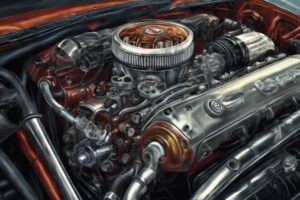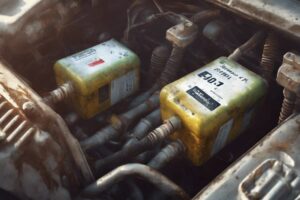If you notice whining noises, burning smells, untimely tire wear, drive shaft vibrations, or handling difficulties, your differential might be faulty.
This can lead to repair costs and may impact your vehicle’s performance and longevity. Causes include abuse, wear and tear, or inadequate lubrication.
Repairs could range from $200 to $300 for basic fixes, up to $2,000 or more for replacements, depending on the issue’s severity. Diagnosis involves fluid analysis, noise detection, and visual inspections.
Timely repair prevents further transmission damage and guarantees your vehicle’s stability and safety. Addressing these symptoms promptly can save you from costly repairs down the road.
Key Points
- Whining noises, burning smell, untimely tire wear, vibrations, and handling issues indicate a bad differential.
- Differential repair costs vary from $200 to $2,000 depending on the severity of the issue.
- Diagnose problems through fluid analysis, noise detection, visual inspection, and diagnostic testing.
- Timely repair prevents further damage, costly repairs, and ensures vehicle performance, stability, and safety.
- Differential failure causes include abuse, wear, towing heavy loads, worn bearings, and inadequate lubrication.
Signs of a Bad Differential

If you hear whining noises, notice a burning smell, experience untimely tire wear, feel drive shaft vibrations, or encounter handling difficulties, these could be signs of a problematic front or rear differential.
Differential maintenance is vital to prevent these issues.
Regularly checking the differential fluid levels and ensuring they’re clean and at the appropriate levels can help avoid costly repairs.
If you suspect a problem, prompt differential replacement might be necessary to prevent further damage to your vehicle.
Ignoring these signs could lead to more severe transmission problems and decreased performance. To address these symptoms effectively, consulting a professional mechanic is advisable.
They can diagnose the issue accurately and recommend the best course of action, whether it be differential maintenance or replacement.
Differential Failure Causes
Differential failure often stems from inadequate lubrication, leading to excessive friction and component wear. To prevent this, make sure proper differential maintenance by using the correct lubricant and maintaining adequate levels.
In addition, consider the following causes of differential failure:
- Abuse: Persistent usage, especially in trucks or SUVs, can accelerate wear on the differential components, increasing the likelihood of failure.
- Wear and Tear: Years of use gradually degrade the differential components, eventually leading to failure even with normal driving conditions.
- Towing Heavy Loads: Damage can occur when towing heavy loads without proper maintenance, causing strain on the differential and potentially leading to premature failure.
- Worn Bearings: Failure to replace worn bearings in the differential can increase stress on other components, hastening overall failure.
Cost of Differential Repair

After recognizing the potential causes of differential failure, it’s imperative to contemplate the cost of differential repair as it varies depending on the specific issues and components requiring attention.
Repair expenses for common differential issues typically fall within the range of $200 to $300.
However, if the damage is more extensive, such as in the case of rebuilding the differential, costs can escalate to around $1,000.
Complete replacement of the differential assembly may require a budget of $2,000 or more. It’s important to note that additional services like oil seal replacement or backlash adjustment can further increase maintenance costs.
The total cost of differential repair is influenced by the severity of the problem and the specific components that need addressing.
When facing differential issues, consider consulting a professional to assess the extent of the damage and provide an accurate estimate for the repair expenses.
Diagnosing Differential Problems
When identifying potential issues with your vehicle’s differential, observing symptoms like whining noises, vibrations, and difficulty turning is key to diagnosing problems accurately.
To effectively diagnose differential problems, consider the following:
- Fluid Analysis: Checking the differential fluid can reveal metal shavings or unusual discoloration, indicating internal damage.
- Noise Detection Techniques: Using specialized equipment to pinpoint specific noises can help identify the source of the problem, whether it’s a worn gear or a failing bearing.
- Visual Inspection: Examining the differential components visually can uncover obvious signs of wear or leaks, providing valuable clues to the underlying issue.
- Diagnostic Testing: Professional mechanics may conduct road tests or use diagnostic tools like borescopes and vibration analyzers to further investigate the differential’s condition.
What are the symptoms of a bad differential and how can it be prevented?
The hydrolock symptoms and prevention of a bad differential can include unusual noises, vibrations, and difficulty turning. Regular maintenance, such as checking fluid levels and addressing leaks promptly, can help prevent differential issues. Keeping an eye on the differential’s condition and addressing any symptoms promptly can also prevent more serious problems.
Importance of Timely Differential Repair

Considering the potential risks associated with delaying necessary repairs, addressing differential issues promptly is essential for maintaining the safety and performance of your vehicle.
Timely differential repair offers several benefits. It prevents further damage to the transmission system, averting potentially costly repairs in the future.
Neglecting differential problems can have serious consequences, leading to unsafe driving conditions and increasing the risk of accidents.
By ensuring timely maintenance of your differentials, you can guarantee excellent performance and handling of your vehicle.
Regular inspection and repair of differentials also contribute to overall vehicle stability and drivability.
Therefore, it’s important to act promptly upon detecting any issues with your differentials to avoid more extensive damage and maintain a safe driving experience.
Remember, prioritizing timely differential repair not only enhances your vehicle’s longevity but also keeps you safe on the road.
Frequently Asked Questions About Differentials
To better comprehend differentials and their role in your vehicle, let’s explore some frequently asked questions.
- Common Misconceptions:
- Q: Are all differential problems costly to fix?
- A: Not all issues require expensive repairs; some can be resolved through regular maintenance or minor adjustments.
- Q: Is a noisy differential always a sign of a major problem?
- A: While unusual noises can indicate issues, they may not always lead to significant repairs; timely diagnosis is key.
- DIY Solutions:
- Q: Can I perform differential maintenance myself?
- A: Basic tasks like checking fluid levels or changing the oil can often be done at home with the right tools and knowledge.
- Q: Are there any warning signs I can look out for to prevent major differential problems?
- A: Monitoring for leaks, unusual sounds, or vibrations can help catch issues early, potentially preventing costly repairs.
As an Amazon Associate we earn from qualifying purchases.










